We have a total of four Kånkens in our family of five (heck I had one as a kid too!), so it’s not an exaggeration to say that I’ve used and abused these things my entire life. And I’m far from alone, the backpack with the red fox is simply the backpack to have if you’re growing up in Sweden (or even the Nordics in general). So what is it that makes Kånken so popular over here, and is it the right backpack for you as well? I’ll do my best to help you make that decision by looking at pros & cons and answering all the questions you might have from my own perspective and with cold hard data.
This post may contain affiliate links, which means I may receive a commission, at no extra cost to you, if you make a purchase through a link. As an Amazon Associate, I earn from qualifying purchases.
First things first: The Kånken is worth the price tag in my own unbiased opinion, as I think the pros (great durability, easy to pack/unpack, water-resistance, fashionable look, compact storage) outweigh the cons (high price, awkward under heavy load, weird shoulder straps).
- It’s very cool
- It’s waterproof
- It’s very durable
- It’s easy to pack and unpack
- It’s compact
- Optimal for everyday use
- It’s dirt-resistant
- It’s expensive
- The shoulder straps aren’t for everyone
- Heavy loads can be uncomfortable
- Requires add-ons to reach full potential
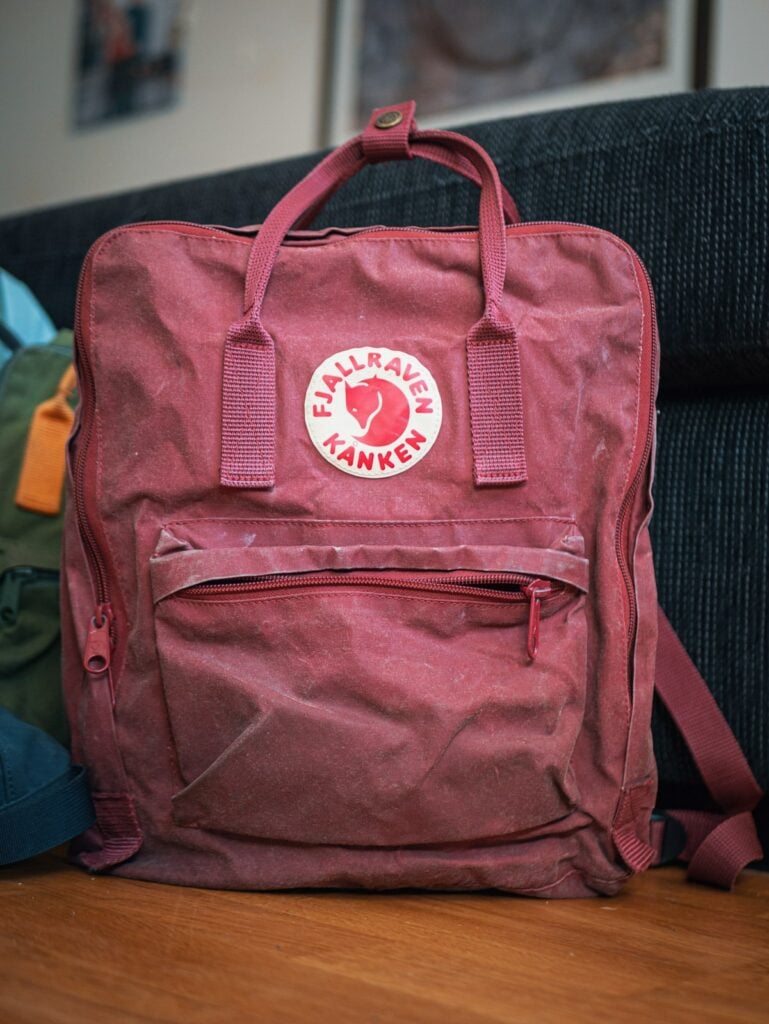
Fjällräven Kånken is a general-purpose backpack, suitable for the outdoors, school, work, and everyday use.
Gender: Unisex
Activity: Everyday Outdoor
Features: Durable, Water-resistant, Quick-drying
Environmental information: Fluorocarbon-free impregnation
Height: 38 cm (15 in)
Width: 27 cm (10.5 in)
Depth: 13 cm (5 in)
Volume: 16 l (4.2 gal)
Weight: 300 g (10.58 oz)
Number of pockets: 3
Pocket locations: inside compartment, outside open pocket(s), outside zipped pocket(s)
Seat pad included: Yes
Is Kånken a Good Backpack and Is It Worth the High Price?
Fjällräven’s Kånken backpack has been a staple for Swedes since the 70s and is still a great backpack for kids and adults alike. The fairly high price is counterbalanced by its iconic look, ergonomic features, great durability, ease of use, water resistance, modular design, and light storage.
On top of the already mentioned high price tag, the Kånken does have a few more cons that I’ve noticed, including how awkward it can be for some when it’s under heavy load. Whenever I’ve loaded it to the brim with heavy items, the shoulder straps have not been very comfortable (though my back has had a good posture at least).
That said, it is possible to add on more comfortable shoulder pads, but that does raise the price even more.
And while this is definitely a modular backpack with many nifty accessories to level up with, you’ll have to shell out a pretty hefty fee for every cool add-on you want. If this isn’t a problem, you’ll love the selection!
I think it’s a great backpack for city use, but if you need a backpack for hiking primarily I’d suggest looking at different models.
Shop Kånken backpacks on Amazon
Shop Kånken backpacks on Fjällräven’s website
Read on to find out where the Kånken comes from, who it suits best and worst, more about its pros and cons, which use cases it has, and much more.
- So What Makes Kånken Worth it? Pros & Cons
- The Story of Kånken: Origins and Why It Is So Popular
- Are Kånkens Waterproof?
- How Long Will a Kånken Last?
- Is Kånken good for hiking?
- Is Kånken good for school?
- Is Kånken good for commuting to work?
- Where Are Kånkens Made?
- What Are the Best Kånken Accessories?
- What Are Some Good Alternatives to Kånken?
ℹ️ This article offers an authentic and unbiased deep dive into Fjällräven’s iconic Kånken backpack from a Swede who has used it daily for 30+ years. I’ll include my own experience with the bag (with both the original and the Mini models), as well as other relevant data I can find that will help you make a better purchase decision.
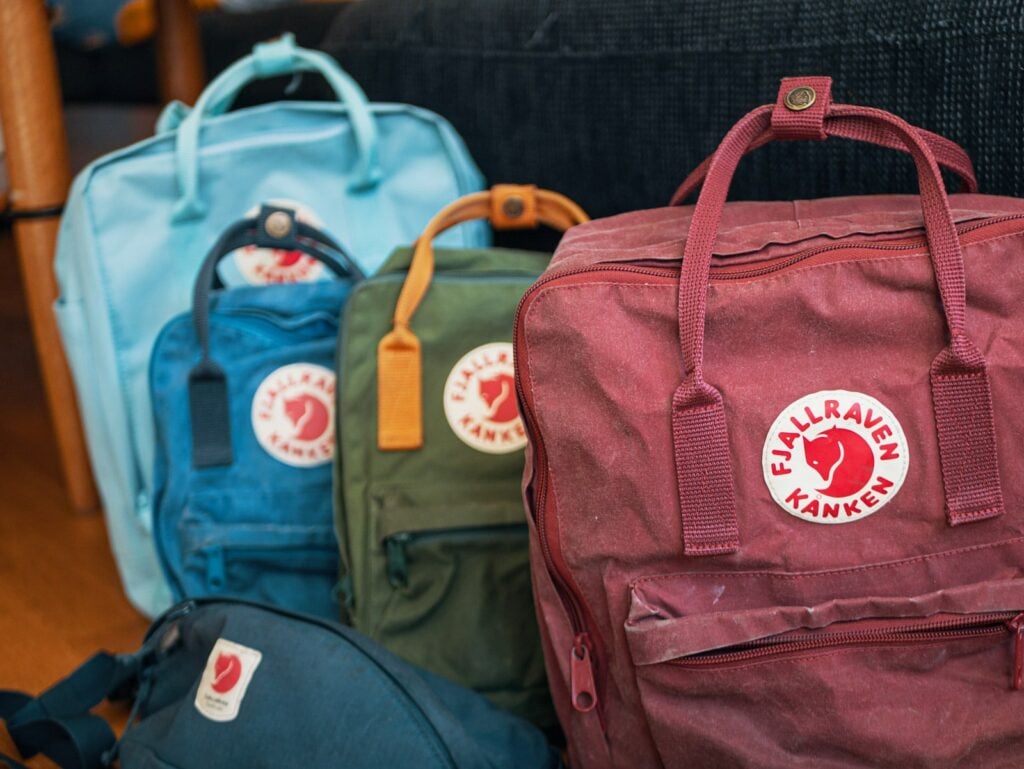
So What Makes Kånken Worth it? Pros & Cons
Let’s look at the Kånken Pros in more detail:
Pro #1: It’s a very cool backpack
There is no denying that the design of this backpack is iconic, and it is certainly a backpack more for the fashionable than the outdoor enthusiasts (although it’s a decent bag for day hikes and similar). Most Kånken owners buy it primarily because they like how it looks, in my experience at least.
Pro #2: It’s waterproof
As already mentioned the backpack will keep things dry with the unique Vinylon F material that expands when exposed to water. I’ve never experienced any issues with water leaking for either the Classic or Mini during the past 6+ years, and we’ve been through some serious attack rains in our days.
Pro #3: It’s very durable
As mentioned we have a total of four Kånkens, and the oldest one has lasted for 6+ years without any visible tear (despite being used heavily in both city and forest environments). It’ll likely last for 10+ years, and I know plenty of Swedes personally who’ve had theirs for 20-30 years.
Pro #4: It’s easy to pack and unpack
The backpack is extremely easy to pack and unpack because of how it opens up, and because of the durability of the different parts. The zipper is great quality and I’ve never had any issues with it getting stuck or similar, and seen no sign of it getting loose anywhere.
Pro #5: It’s compact
When you’re not using the backpack it slots away nicely wherever you want it to. And if you don’t have anything inside of it, it barely weighs anything at all!
Pro #6: It’s modular
For the more advanced backpack connoisseurs, there are loads of cool and nifty add-ons that will enhance your backpack experience greatly. Accessories include more comfortable shoulder pads, organizer, card wallet, laptop case, bottle pocket, and more.
And let’s look more closely at the Kånken cons:
Con #1: It’s expensive
Not only is the base backpack fairly expensive compared to most bags in this category, in order to utilize the full potential of the backpack you’ll likely need to shell out even more money for add-on accessories. I should add that when you factor in how long a Kånken lasts, the price point isn’t as much of a negative.
Con #2: The shoulder straps aren’t for everyone
The shoulder straps have a tendency to cut into the shoulders a bit for some users, which in fact might be by design as there are more comfortable shoulder pads available as a $30-something add-on. With these extra pads, this isn’t an issue.
Con #3: Heavy loads can be uncomfortable
Whenever we load our Kånkens to the max (for longer journeys across the Atlantic and similar), the shoulder straps have a tendency to cut into our shoulders a bit. with the mentioned shoulder pads, this isn’t as much of an issue anymore.
The Story of Kånken: Origins and Why It Is So Popular
As messenger-style bags became common among Swedish school kids in the 1970s, there was a rise in back problems and bad postures according to Fjällräven founder Åke Nordin. So he designed the Kånken backpack in 1978, made specifically to “straighten the backs” of Swedish school kids and last for whatever they put them through.
Fun fact: It was sized so that a Stockholm phone book could fit inside the main compartment, but was of course meant to hold school books primarily.
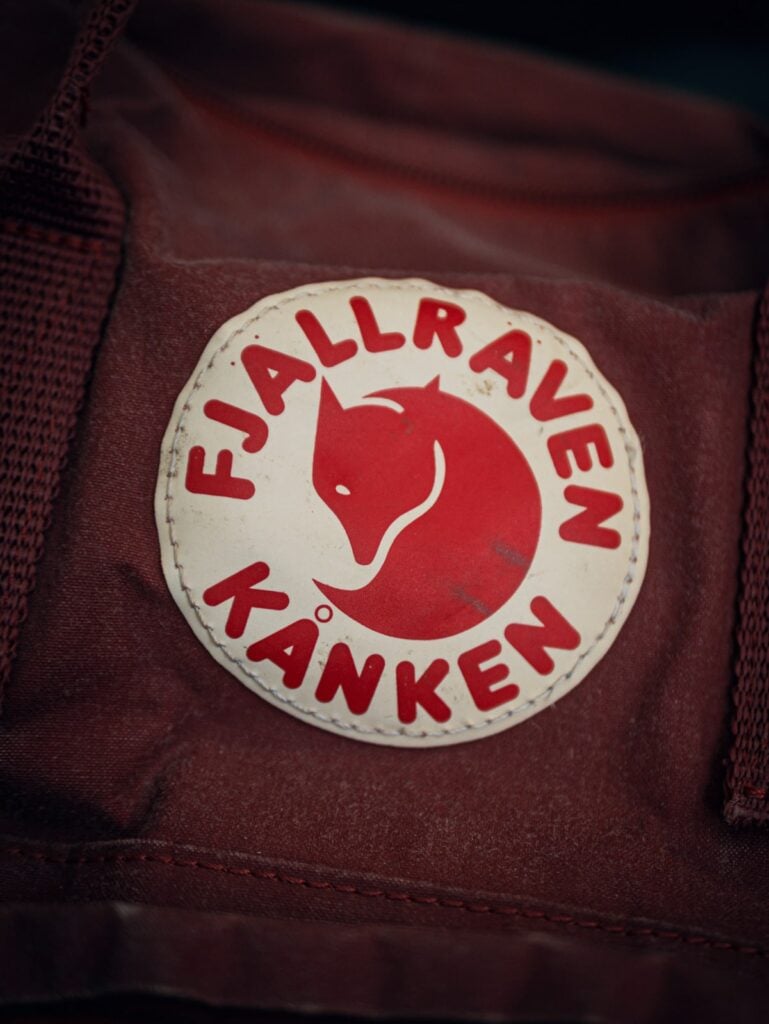
The first year saw a modest 400 Kånken backpacks sold, but it soon became apparent that there was a huge demand for this type of backpack among Swedish families, with 30 000 sold the following year.
Since then the Kånken has spread across the globe, with hipsters in Brooklyn just as likely to wear it as school kids in Sweden still are.
Are Kånkens Waterproof?
The Kånken backpack is made of a synthetic material called Vinylon F, which behaves like a natural fiber that swells up when exposed to water, essentially becoming more resistant to water penetration the wetter it gets.
I can attest to the water resistance in both the Kånken Classic and Mini, as we’ve brought them on rainy hikes or walks plenty of times without any issue with wet clothes, gadgets or food on the inside.
I’d still have a laptop or similar in a separate case, as there is no padding for when you put it down on the ground or similar.
How Long Will a Kånken Last?
The oldest Kånken we own has been in great condition for at least 6 years, and I can see it lasting well beyond 10-15 years with the current level of usage. And during this particular Kånken’s lifetime, it has been lugged around schools, buses, trains, airports, workplaces, hikes, picnics, and moose hunts.
So normal to rough levels of wear and tear, used almost daily, and still in great condition.
A lifetime of 10-15 years is what I’ve heard from friends and family, and seen across forums and reviews as well. That said, I also know plenty of Swedes personally who’ve had theirs for 20-30 years.
It wouldn’t surprise me if my kids’ Kånkens would last their entire childhood and then some.
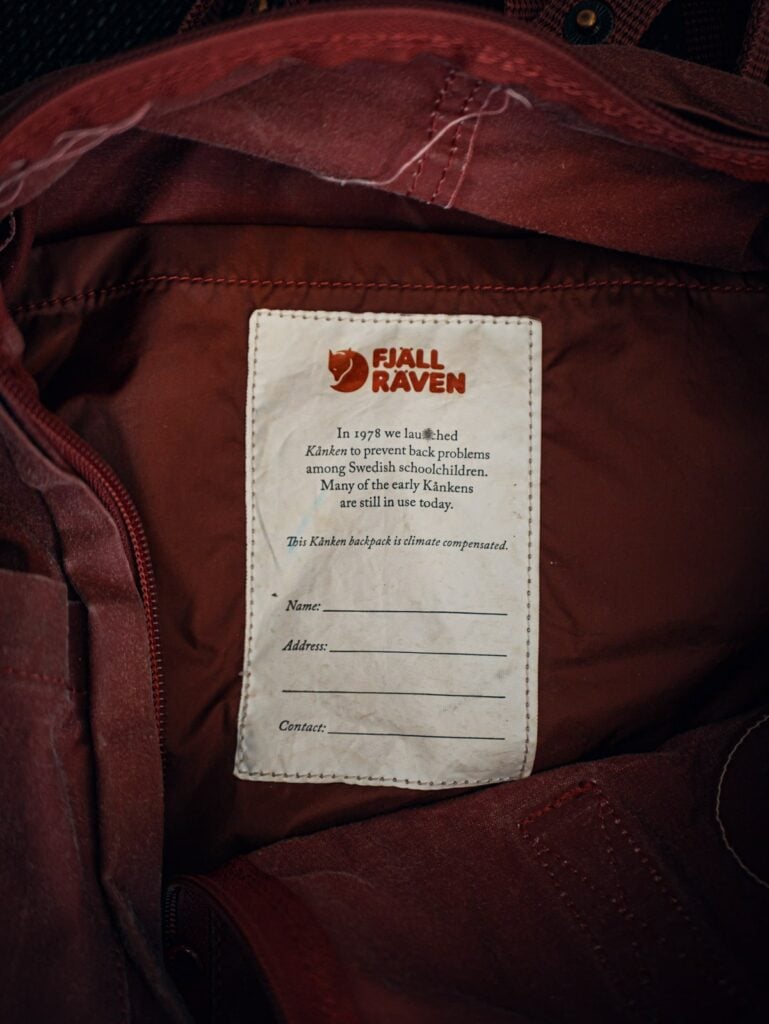
Is Kånken good for hiking?
The Kånken backpack can definitely be used for short hikes as it is both durable and waterproof, but it was primarily designed as a school backpack for kids of all ages. So it makes a bit more sense to wear it in city parks rather than on mountain tops.
Things to know before you go hiking with a Kånken:
- There is a seat cushion inside that’s great for breaks
- There aren’t many places to fasten hooks or tie on sleeping mats
- The Kånken is very light and is great for short hikes that don’t require a lot of packing
- The straps can get a bit uncomfortable if you pack heavy and walk for long periods of time
- There is no padding on the inside, so make sure you protect things that may be sensitive to bumps (like tech gadgets or similar)
Is Kånken good for school?
The Kånken backpack was originally designed for school kids in 1970s Sweden, and is still today a great option for everyday use by kids who may or may not be very careful with the backpack.
Things to consider using a Kånken as a school backpack
- According to Fjällräven the pack is designed to straighten and be nice to the back of the wearer
- You will be able to fit plenty of books and folders, even the thickest ones, but it may get a bit uncomfortable if it’s too heavy
- There is no padding so make sure you have a good cover on any laptop (13 inches or smaller) or similar you put inside
- If you have a 15 inch laptop or larger, you’ll need the Kånken Maxi model
- The label on the back is reflective, great to stay visible when walking to and from school in the dark
- The carrying handles on the top of the backpack are great for moving the pack around short distances
- The pack has two flat side pockets and a zipped pocket on the front for smaller items
- If you’d like to bring a water bottle you could fit a smaller one on the side,
- For bigger water bottles, there are separately sold “Bottle pockets” that fit any type of popular water bottle
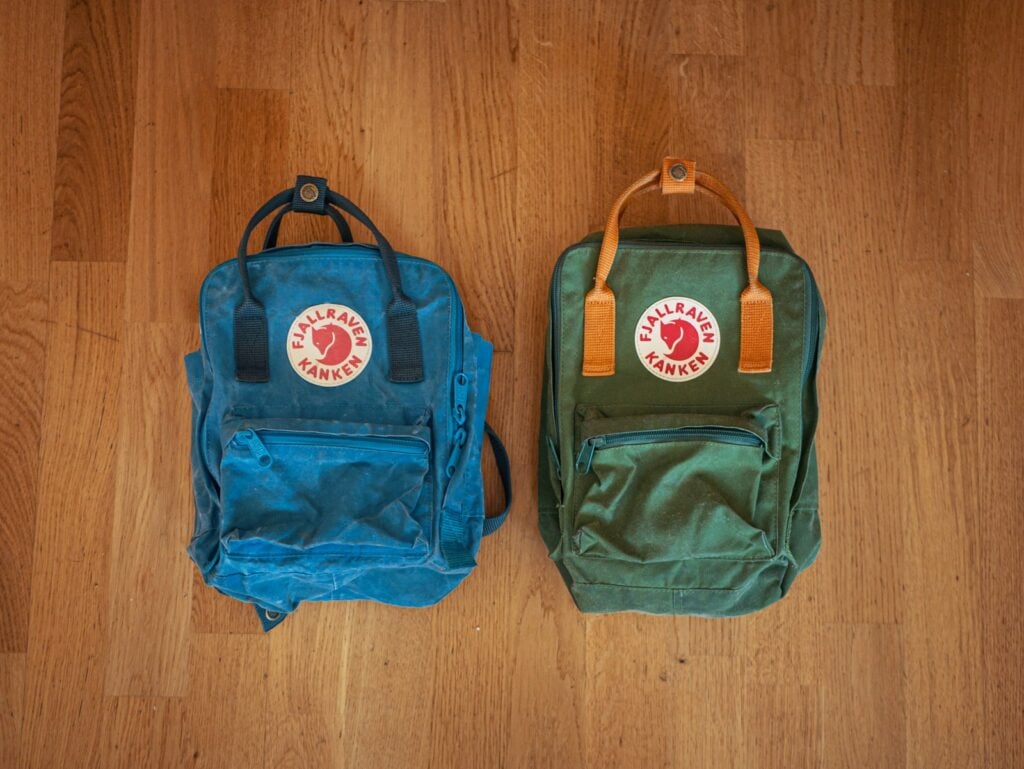
Is Kånken good for commuting to work?
A Kånken backpack is an excellent backpack for anyone commuting to and from work every day, as it is durable enough to be used daily in commuter environments (i.e. pretty rough use from time to time), light enough to be nimble when you need it to be, and has a practical handle you can switch to whilst on the train or bus.
Things to consider using a Kånken as a work backpack:
- If you are suffering from bad posture a Kånken might help with that, as it’s designed to straighten your back over long-term use
- You will be able to fit a laptop and plenty of work documents and folders, even the thickest ones.
- The backpack straps may get a bit uncomfortable if the load is too heavy
- There is no padding so make sure you have a good cover on any laptop (13 inches or smaller) or similar you put inside
- If you have a 15 inch laptop or larger, you’ll need the Kånken Maxi model
- The carrying handles on the top of the backpack are great when you’re on a train, bus, or similar, and need to be extra nimble
- The pack has two flat side pockets and a zipped pocket on the front for smaller items
- If you’d like to bring a water bottle you could fit a smaller one on the side,
- For bigger water bottles, there are separately sold “Bottle pockets” that fit any type of popular water bottle
Where Are Kånkens Made?
Kånkens are manufactured in Vietnam and China, like pretty much all high-end outdoor brands are today. Like many Swedes, I’d prefer if they were still produced closer to home, but that has become rare as the juggernaut of globalization blazes ahead.
It’s worth noting that although Fjällräven might have moved its production chain to Asia, the production process, materials used, and quality control were brought over from its Swedish operations.
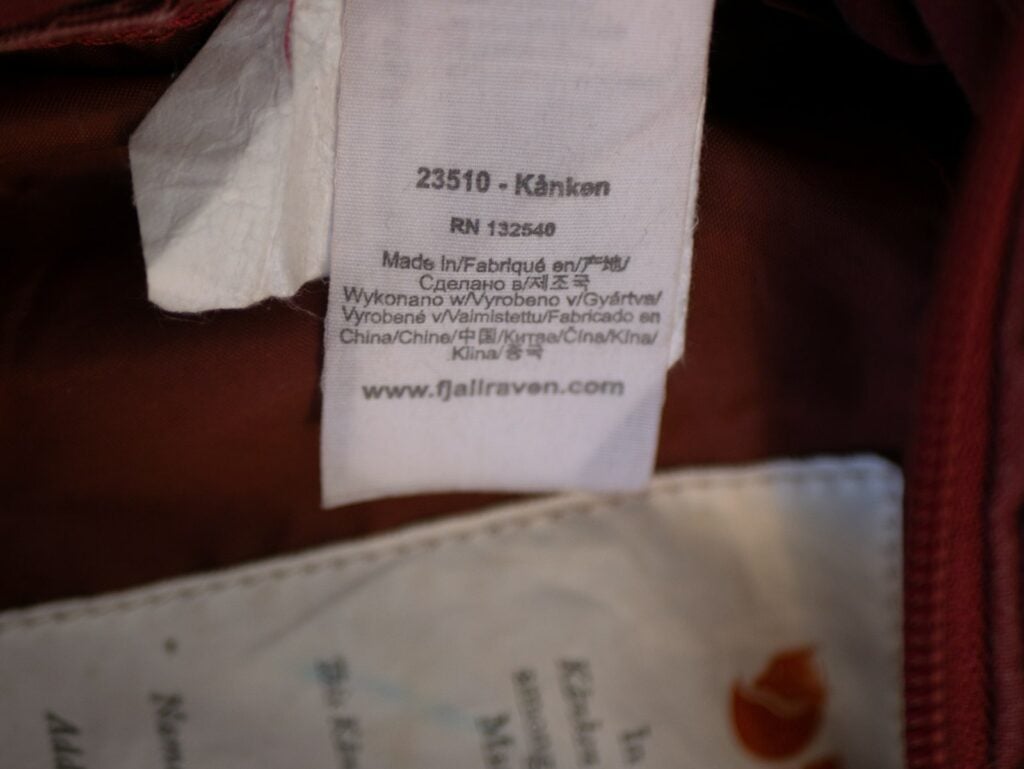
For reference, this is what Fjällräven says about the country of origin of Kånkens:
Fjallraven utilizes multiple manufacturing facilities that produce the Kanken both in China as well as Vietnam. This is the reason that some tags will list China, while others Vietnam. It is however the same product.
Fjällräven USA via Amazon
Are Kånkens Made in Vietnam and China Still High Quality?
Gear and clothing made in Asian factories can definitely hold a high standard, as evident in the durability in Kånkens specifically (we have one regularly used for 8+ years that’s Made in China, and it’s in almost perfect condition still). There are of course many more high-quality Asian-made models and products that are sold around the world that will also back this up.
What Are the Best Kånken Accessories?
Buying extra accessories for your Kånken isn’t a must, but in order to get the most out of your Kånken and to unlock its true potential, you’ll pretty much have to buy an accessory of some kind.
Here are my favorite Kånken accessories which can be a good starting point if you’re looking to deck out your backpack a bit:
- The Bottle Pocket
- The Organizer
- The Shoulder Pads
- The Chest Strap
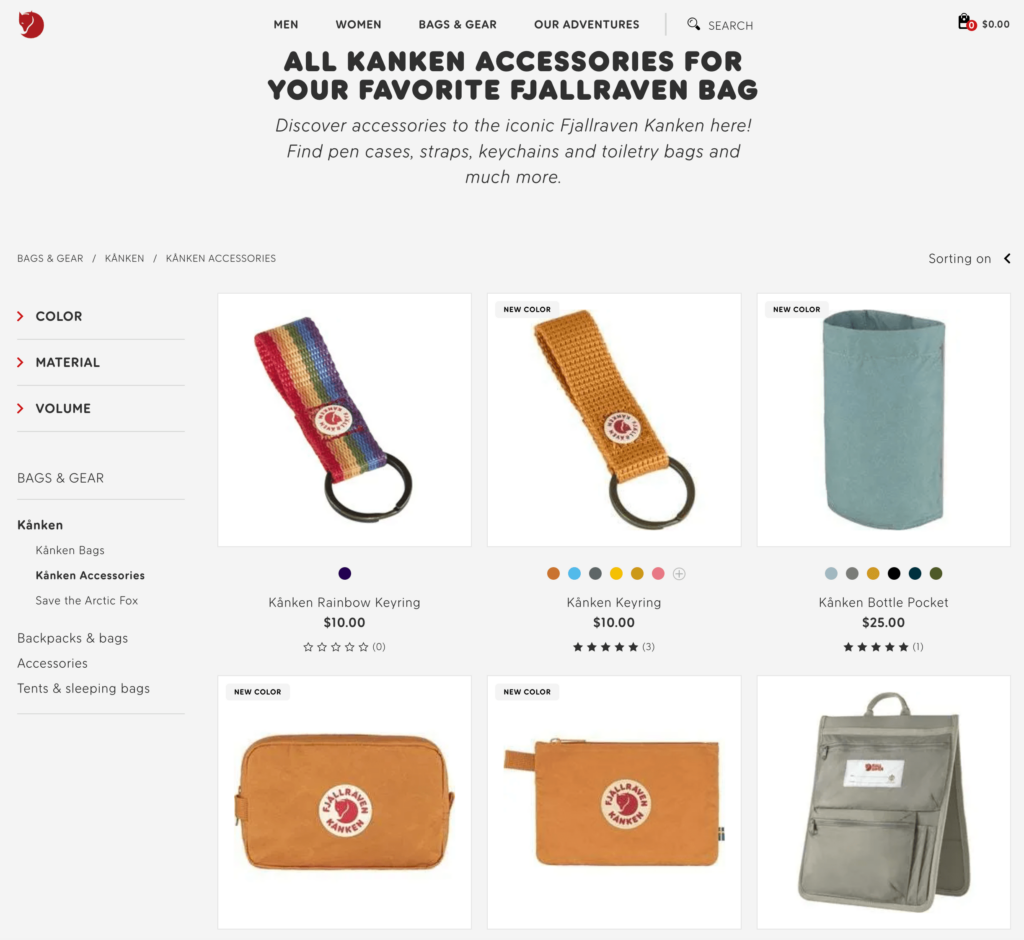
What Are Some Good Alternatives to Kånken?
Alright, so maybe a Kånken isn’t for you? After all, there are plenty who feel that the price tag doesn’t match the features of the bag, which I can certainly understand.
So here are some alternative backpacks that are designed in a similar fashion, with a comparable feel to them, and that can be used in a similar manner to a Kånken backpack (note that I have not owned these personally, only seen them and read about them):
Muji rucksack with adjustable handles (Designed and made in Japan)
Himawari Backpack (Designed and made in the Philippines in a Japanese style)
Anello Canvas Backpack on Amazon
Jansport Superbreak Plus on Amazon
Carhartt Legacy Standard on Amazon
The North Face Jester School Laptop Backpack on Amazon
The North Face Tote Pack on Amazon
Pacsafe Citysafe CX Antitheft Backpack on Amazon
Patagonia Women’s Tamangito 20L
Swissgear Artz Laptop Backpack on Amazon
Danton Classic Backpack on Mono
United by Blue Westward Convertible Tote Pack
Manhattan Portage Euclid on Amazon
Cath Kidston’s frame backpacks
Herschel Travel Tote on Amazon
Eastpak Women’s Pak’r on Amazon
Delsey Montrouge Backpack on Amazon
L.L. Bean Mountain Classic Cordura Totepack
Patagonia Ultralight Black Hole
Timbuk2 Convertible Backpack Tote
Manhattan Portage Black Label Chrystie Bag
Travelon Antitheft Convertible Backpack
Travelon Urban Convertible Tote
Show more alternatives +Sources:
https://www.fjallraven.com/us/en-us/about/our-history
 The Best Scandinavian Winter Boots for Everyday Use (2024)
The Best Scandinavian Winter Boots for Everyday Use (2024) The Lands of Heavy Metal: Most Metal Bands Per Capita (2025 World Map)
The Lands of Heavy Metal: Most Metal Bands Per Capita (2025 World Map) The 36 Best & Most Popular Swedish Chocolate Brands
The 36 Best & Most Popular Swedish Chocolate Brands The 44 Best Scandinavian Outdoor Clothing Brands
The 44 Best Scandinavian Outdoor Clothing Brands

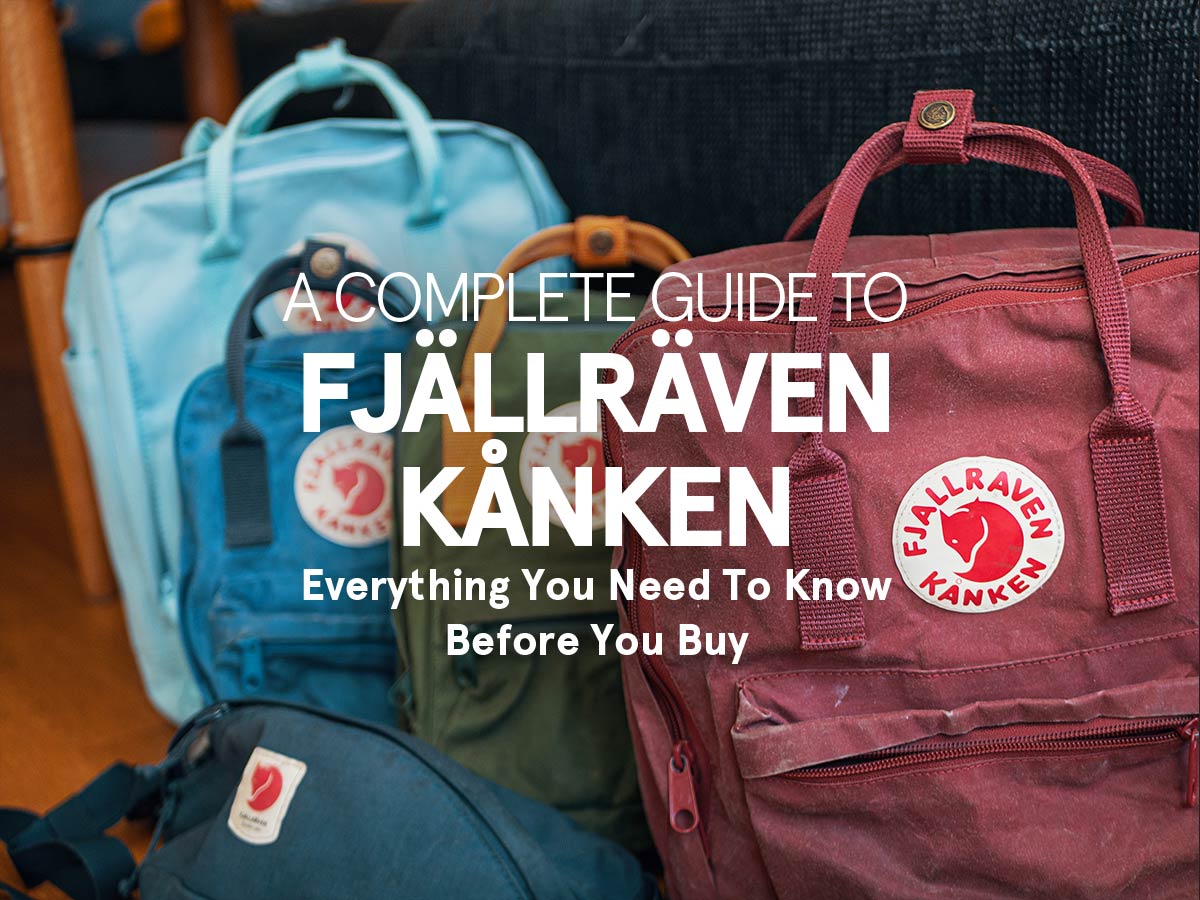
I work at Fjällräven Brand Store.
And i would recommend the Kånken Laptop version (comes in 13, 15 and 17 inches.) over the original.
Cause the better straps are included.
Own pocket for the laptop.
Also Kånken no2 or Kånken Laptop no2 is made in the G1000 material that Fjällräven hiking cloths are made off so it can be waxed to maintain it after lot of use and make it more water resistant.
Cause the original and non no2 version is not water proof only resistent and we at the store will recommend buying a rain cover to secure your items.
Hi!
I have unfortunately not tried the laptop versions of the Kånken but sounds like I should in the future! I do love the G1000 material from my Räven jacket so I can definitely believe that it would work well on a backpack as well.
Thanks for providing some further insight!
–Karl
Fjall raven Bp is the best
Fjall raven Bp is the best saya sangat menyukainya dah sudah menggunakan ya Dr th 94 masa kuliah
What a detailed review! This had just convinced me to purchase my first Kånken! Thanks heaps , cheers x
Happy to help Angie, thanks for reading!
–Karl